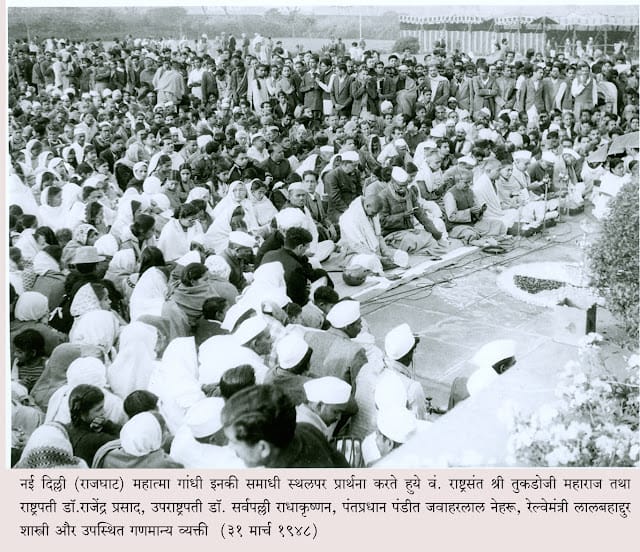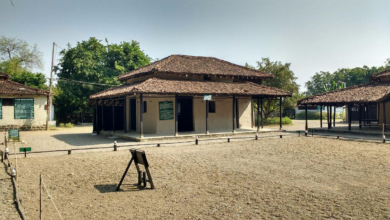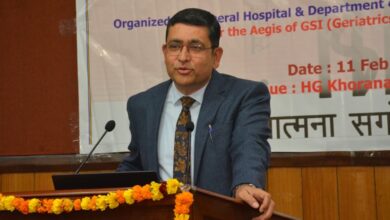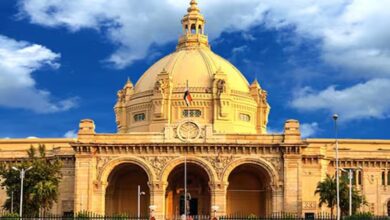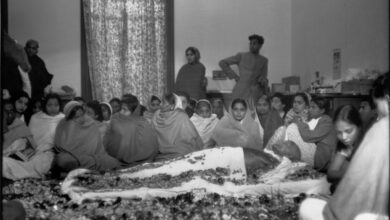The Timeless Bond Between Rashtrasant Tukdoji Maharaj and Mahatma Gandhi
By Dr. Siby K. Joseph
Rashtrasant Tukdoji Maharaj, born as Manik Bandoji Ingle on 30 April 1909 in Yawali, Maharashtra, emerged as a spiritual leader, bhajan singer, and nationalist who left a lasting impact on India’s freedom movement and social fabric. Born into a humble family, Tukdoji Maharaj received his early education in Yawali and Warkhed, and later came under the spiritual guidance of Adkoji Maharaj, who bestowed upon him the name “Tukdoji.”
First Meeting with Mahatma Gandhi – 1935
Mahatma Gandhi first met Tukdoji Maharaj in 1935 at Nagpur under awkward circumstances stemming from a false complaint. However, the meeting quickly dispelled misunderstandings and laid the foundation for a deep and lifelong friendship. Gandhi later invited Tukdoji to Sevagram Ashram, where he stayed for over a month.
Gandhi affectionately called him “Buva” and was moved by his soulful bhajans, which were sung during the evening prayers. One bhajan on Lord Rama left such a deep impression on Gandhi that he referred to it in a 1947 prayer meeting in Delhi and again in a 1948 letter.
Gandhi’s Admiration and Letters
Gandhi frequently mentioned Tukdoji in his correspondence. Writing to Pyarelal on July 12, 1936, he noted:
“Right now Tukde Maharaj is keeping me company. He has an endless treasure of bhajans. All of them sound beautiful. Come if you feel you want to listen.”
In another letter to Amrit Kaur, Gandhi described him as a “young sadhu and great bhajani, composer and singer of bhajans.” In Harijan (August 1, 1936), Gandhi also highlighted how Tukdoji was setting a powerful example by associating with Harijans and eating food cooked by them.
Support in Gandhian Ideals and Social Reforms
Tukdoji Maharaj was an active participant in Gandhi’s discussions on caste and untouchability. In a profound interaction, when Gandhi asked if he was without sin, Tukdoji humbly replied, “No, by no means.” This strengthened Gandhi’s stance that scriptures supporting untouchability must be questioned.
Tukdoji stood by Gandhi in the fight against untouchability and through his bhajans spread the message of social reform and spiritual equality.
Role in the Freedom Movement
Tukdoji Maharaj played a pivotal role in the Quit India Movement of 1942. Through his powerful and patriotic bhajans, he inspired countless Indians to join the struggle. He was imprisoned in various Central India jails for his activism.
Even in his absence, his influence was felt. On December 7, 1944, Gandhi addressed 225 members of the Gurudeo Sewa Mandal (founded by Tukdoji) at Sevagram and expressed regret that Tukdoji couldn’t be present due to a government ban.
Tribute to Gandhi and Continued Legacy
On the day of Mahatma Gandhi’s assassination, Tukdoji Maharaj was at his Ashram in Mojari. Though he wished to travel to Delhi, he was advised against it due to national unrest. He honored Gandhi’s memory through condolence meetings across the country and later joined a prayer meeting at Rajghat on 31 March 1948, attended by leaders like Dr. Rajendra Prasad, Jawaharlal Nehru, and Dr. S. Radhakrishnan.
Gandhian Influence on Gram Geeta and Bhoodan Movement
Tukdoji Maharaj’s seminal work Gram Geeta was a reflection of Gandhian values. In Chapter 39, he wrote:
“Village self-rule is the true Ram Rajya. Self-sufficiency is the true Swaraj. This is how the reverend Mahatma described the beauty of village development.”
He also joined hands with Acharya Vinoba Bhave during the Bhoodan Movement, further extending his Gandhian legacy.
Living Spiritual Legacy
His popular bhajans such as “Tere Naam Anek, Tu Ek Hi Hai” (You have many names, but you are one) and “Sabke Liye Khula Hai, Mandir Yeh Hamara” (This temple is open to all) continue to resonate in Sevagram Ashram’s daily prayers.
Tukdoji Maharaj passed away on 11 October 1968. In 2005, Nagpur University was renamed Rashtrasant Tukadoji Maharaj Nagpur University in his honor.
His commitment to interfaith harmony, social reform, and Gandhian ideals is a beacon of hope in today’s climate of religious and communal polarization.
⸻
About the Author
Dr. Siby K. Joseph
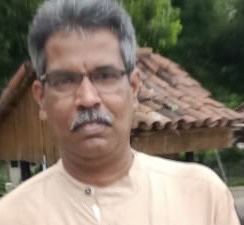
Director, Sri Jamnalal Bajaj Memorial Library and Research Centre for Gandhian Studies
Sevagram Ashram Pratishthan, Sevagram, Wardha – 442102, Maharashtra
Email: directorjbmlrc@gmail.com

